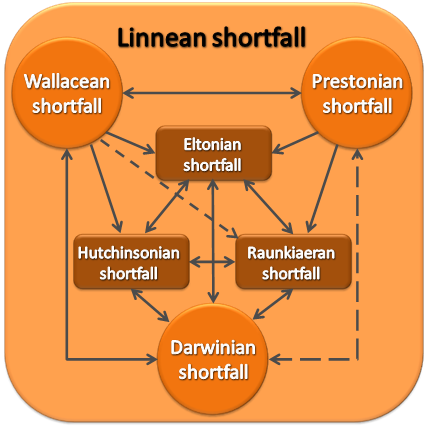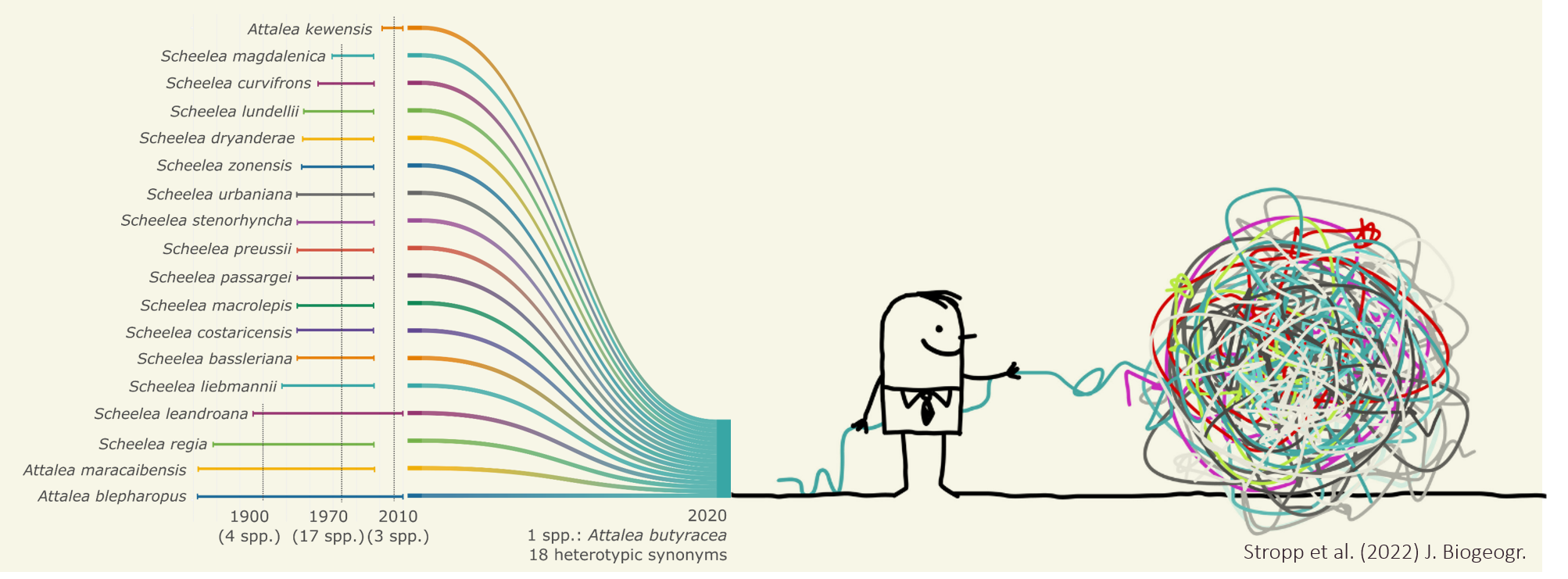Tropibio invites to the Workshop on Biodiversity, Knowledge and Ignorance.
Know MoreEvent


Know More
November 16th, 2022
CIBIO and online
Tropibio
TROPIBIO project invites to the Workshop on Biodiversity, Knowledge and Ignorance: on November 16, 2022 at 3pm (GMT+1/WEST).
Moderated by Richard Ladle, the expert panel are composed of: Joaquin Hortal, and Juliana Stropp from Department of Biogeography and Global Change, Museo Nacional de Ciencias Naturales (MNCN-CSIC), Madrid.
- Talk 1: Describing ignorance: Mapping biodiversity knowledge shortfalls (Joaquin Hortal): to know more
- Talk 2: Taxonomic uncertainty and the challenge of estimating global species richness (Juliana Stropp) to know more
Language: English
Presential at CIBIO auditorium or Online
Questions: tropibio@cibio.up.pt


Summary of talk 1: Ecologists and evolutionary biologists are increasingly using approaches based on massive data analysis to investigate the origin, distribution and dynamics of biodiversity at large spatial, taxonomic and temporal scales. Great efforts are being made to bring together in large databases the information collected by expeditions and fieldwork over more than two centuries of biodiversity inventories. However, despite the mobilization of this vast amount of information, our ability to answer many key questions in ecology and evolution is limited by the lack of data of sufficient quality. I will explain the concept of shortfall or knowledge gap, reviewing the conflicts between generality and uncertainty in research results. I will also describe the seven major deficiencies in current biodiversity data, corresponding to lack of knowledge about taxonomy (Linnaean deficit), distribution (Wallacean), abundance (Prestonian), evolutionary relationships (Darwinian), abiotic tolerances (Hutchinsonian), functional traits (Raunkiaeran) and biotic interactions within and between species (Eltonian). Then, I will review briefly current developments of in the analytical framework that allows us to measure these deficits, determine their impact on research, find ways to overcome or reduce these seven knowledge gaps, and deal with the uncertainty they generate. Finally, I will show examples of application of this conceptual framework, such as bias analysis, the study of knowledge stabilization or maps of biogeographic ignorance. The latter allows estimating the spatio-temporal uncertainty in both the geographic distribution of biodiversity data and the estimates and models generated with these data, and may even allow to improve model predictions.
Summary of talk 2: Without taxonomy, ecological research is unthinkable. Key aspects of ecology, from understanding biodiversity to identifying conservation targets depend on how organisms are classified. Yet most sub-disciplines of ecology, including macroecology, treat taxonomy as static, while in reality, it is dynamic and subject to frequent change. In this talk, I will discuss the challenges of accounting for taxonomic change in macroecological analysis. I will show that by tracking the taxonomic history of species we can develop a more robust understanding of the current patterns of species richness and composition. The talk will conclude by proposing the types of taxonomic data that are most needed for macroecology. I will highlight the new opportunities that re-use and digital accessibility of taxonomic data can bring to biodiversity research and conservation.
Joaquín Hortal is a biogeographer and community ecologist, working as scientific researcher at the Department of Biogeography and Global Change of the Museo Nacional de Ciencias Naturales (CSIC). He is also scientific collaborator at the Postgraduate Course on Ecology and Evolution of the Universidade Federal de Goiás and the Centre for Ecology, Evolution and Environmental Changes (cE3c) of the Universidade de Lisboa, and member of eBryo – Research Group on Experimental Bryology. His main research aim is to understand why is biodiversity distributed the way it is in space and time, with particular interest on community structure. This requires identifying the processes that drive the spatial and temporal dynamics of ecological assemblages. His current work aims at unifying into a single framework the different hypotheses about the origin of geographic gradients of biodiversity and community dynamics; in particular, the interplay of niche and coexistence as determinants of species co-occurrence, and the effects of the evolutionary history of species, glaciations and current climate.
Juliana Stropp is an ecologist with 15 years of research experience in tropical biodiversity. Her current research bridges two disciplines that have long co-existed in relative isolation: macroecology and taxonomy. She explores how the dynamics of species discoveries and taxonomic re-classifications impact established biodiversity patterns. For this, she integrates information from field surveys, historical botanical monographs and large biodiversity databases. This work builds on her experience in conducting botanical surveys in the Amazonian rainforest and her analytical skills in biodiversity informatics. Juliana has followed an international career path and worked at the National Research Institute for Amazonian Research, Utrecht University, the Joint Research Centre of the European Commission, and the University of Alagoas. Since December 2019, she works at the Museo Nacional de Ciencias Naturales (MNCN-CSIC; Madrid, Spain) first as a Marie Curie fellow and then as a post-doctoral researcher.
Summary of talk 2: Without taxonomy, ecological research is unthinkable. Key aspects of ecology, from understanding biodiversity to identifying conservation targets depend on how organisms are classified. Yet most sub-disciplines of ecology, including macroecology, treat taxonomy as static, while in reality, it is dynamic and subject to frequent change. In this talk, I will discuss the challenges of accounting for taxonomic change in macroecological analysis. I will show that by tracking the taxonomic history of species we can develop a more robust understanding of the current patterns of species richness and composition. The talk will conclude by proposing the types of taxonomic data that are most needed for macroecology. I will highlight the new opportunities that re-use and digital accessibility of taxonomic data can bring to biodiversity research and conservation.
Joaquín Hortal is a biogeographer and community ecologist, working as scientific researcher at the Department of Biogeography and Global Change of the Museo Nacional de Ciencias Naturales (CSIC). He is also scientific collaborator at the Postgraduate Course on Ecology and Evolution of the Universidade Federal de Goiás and the Centre for Ecology, Evolution and Environmental Changes (cE3c) of the Universidade de Lisboa, and member of eBryo – Research Group on Experimental Bryology. His main research aim is to understand why is biodiversity distributed the way it is in space and time, with particular interest on community structure. This requires identifying the processes that drive the spatial and temporal dynamics of ecological assemblages. His current work aims at unifying into a single framework the different hypotheses about the origin of geographic gradients of biodiversity and community dynamics; in particular, the interplay of niche and coexistence as determinants of species co-occurrence, and the effects of the evolutionary history of species, glaciations and current climate.
Juliana Stropp is an ecologist with 15 years of research experience in tropical biodiversity. Her current research bridges two disciplines that have long co-existed in relative isolation: macroecology and taxonomy. She explores how the dynamics of species discoveries and taxonomic re-classifications impact established biodiversity patterns. For this, she integrates information from field surveys, historical botanical monographs and large biodiversity databases. This work builds on her experience in conducting botanical surveys in the Amazonian rainforest and her analytical skills in biodiversity informatics. Juliana has followed an international career path and worked at the National Research Institute for Amazonian Research, Utrecht University, the Joint Research Centre of the European Commission, and the University of Alagoas. Since December 2019, she works at the Museo Nacional de Ciencias Naturales (MNCN-CSIC; Madrid, Spain) first as a Marie Curie fellow and then as a post-doctoral researcher.